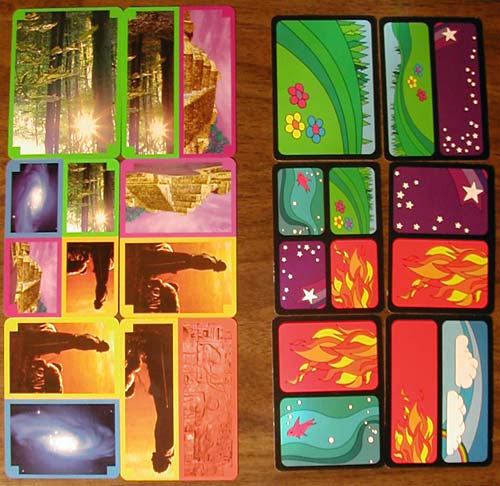 This is an interesting point of designing and publishing games that I wanted to share. In 2003 Covenant Communications published a game entitled: Search, Ponder, and Play! (here) The person who submitted the design to Covenant Communications claimed it as being their own design or just didn't say that it was a re-theme of another game that had already been published: Aquarius (here). Aquarius is a game designed and published by Andrew Looney of Looney Labs in 1998. Search, Ponder, and Play! is a game that just put different images and themes on the cards and theme of Aquarius. Here is an image of the cards from each game side-by-side:
This is an interesting point of designing and publishing games that I wanted to share. In 2003 Covenant Communications published a game entitled: Search, Ponder, and Play! (here) The person who submitted the design to Covenant Communications claimed it as being their own design or just didn't say that it was a re-theme of another game that had already been published: Aquarius (here). Aquarius is a game designed and published by Andrew Looney of Looney Labs in 1998. Search, Ponder, and Play! is a game that just put different images and themes on the cards and theme of Aquarius. Here is an image of the cards from each game side-by-side:The game was brought to the attention of Andrew Looney in 2004, where upon he posted about it (read the whole thing here). His wife decided to write Covenant Communications a letter. Andrew Looney was, understandably, quite upset that such a thing had happened. As was his wife. In the end it appears that everything came out fairly well, as well as could probably be expected. Covenant Communications ended up producing a second version of the game in which they credit Looney Labs and state that permission has been gained to publish this version of the game. It's interesting to me that in all the designing and publishing that goes on that this kind of thing hasn't happened more.
 Also, I wonder what kind of impact, if any at all, this sort of thing has on people's perception of LDS/Mormon themed games. A lot of my experience has been that LDS themed games are re-makes of previously published games. I think that this is probably a safe move by publishers. I mean, if a previously published game is successful, then re-doing it as an LDS themed game is more likely to be successful too. I don't know that this is the case or the reason behind this, but it seems logical. Designing games is also a very time consuming process. You have to design, play-test, tweak, play-test, revise, play-test, etc, etc, etc. But when a game is simply re-themed, there isn't much besides new artwork and a little thought that goes into the components that is needed.
Also, I wonder what kind of impact, if any at all, this sort of thing has on people's perception of LDS/Mormon themed games. A lot of my experience has been that LDS themed games are re-makes of previously published games. I think that this is probably a safe move by publishers. I mean, if a previously published game is successful, then re-doing it as an LDS themed game is more likely to be successful too. I don't know that this is the case or the reason behind this, but it seems logical. Designing games is also a very time consuming process. You have to design, play-test, tweak, play-test, revise, play-test, etc, etc, etc. But when a game is simply re-themed, there isn't much besides new artwork and a little thought that goes into the components that is needed.
Is there a market for new games in the LDS market? What do you think?
Continue reading at the original source →




